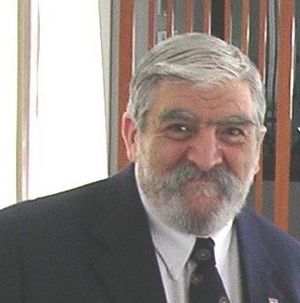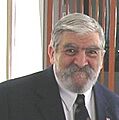Daniel N. Robinson facts for kids
Quick facts for kids
Daniel N. Robinson
|
|
|---|---|
 |
|
| Born | March 9, 1937 Monticello, New York
|
| Died | September 17, 2018 (aged 81) Frederick, Maryland
|
| Alma mater | B.A. Colgate University Ph.D. City University of New York (Neuropsychology) |
| Awards | Lifetime Achievement Award (American Psychological Association Division of the History of Psychology) Distinguished Contribution Award (American Psychological Association Division of Theoretical and Philosophical Psychology) Distinguished Alumni Award (2009), Graduate Center, City Univ. New York Joseph Gittler Award (American Psychological Association |
| Scientific career | |
| Fields | Philosophy of Mind Philosophy of Psychology Philosophy of Law History of Psychology |
| Institutions | University of Oxford Georgetown University |
Daniel Nicholas Robinson (born March 9, 1937 – died September 17, 2018) was an American psychologist. He taught psychology at Georgetown University. Later in his life, he became a special member of the philosophy department at Oxford University.
Daniel Robinson's Work and Career
Daniel Robinson was a very busy thinker! He wrote about many different topics. These included how we think about right and wrong (called moral philosophy), the science of the mind (philosophy of psychology), and even how laws are made and understood (legal philosophy). He also studied the history of ideas and the history of psychology.
He taught at several well-known universities. These included Amherst College, Georgetown University, Princeton University, and Columbia University.
Helping with TV Shows
Beyond teaching, Daniel Robinson helped create award-winning TV series. He was a main advisor for PBS and the BBC shows "The Brain" and "The Mind." He also gave lectures for "The Great Courses" series on philosophy, which helps people learn about complex ideas.
Awards and Recognition
In 2011, he received the Gittler Award from the American Psychological Association. This award recognized his important contributions to the basic ideas behind psychology. He also received a Lifetime Achievement Award and a Distinguished Contribution Award from the American Psychological Association.
Daniel Robinson's Main Interests
Robinson was interested in many areas. These included how our brains work, philosophy (the study of knowledge and existence), law, and the history of ideas. Some of his books show these wide-ranging interests.
Understanding the History of Psychology
One of his most famous books is An Intellectual History of Psychology. This book is considered a classic in its field. A famous psychologist named Ernest Hilgard praised it. He said the book explored how ideas developed and offered new ways to think about the mind. He felt reading it was a "genuine intellectual adventure."
Thoughts on Aristotle and Psychology
Robinson was also very interested in the ideas of the ancient Greek philosopher Aristotle. He wrote a book called Aristotle’s Psychology. Another scholar, Deborah Modrak, said this book was "easy to read and informative." She believed it would make readers think about how Aristotle's old ideas are still important for modern psychology. Robinson was even part of a small group that helped start the idea of Positive Psychology in 1999. This field focuses on what makes people happy and thrive.
Science, Law, and the Insanity Defense
In his book Wild Beasts and Idle Humours, Robinson explored how science and law have been connected throughout history. He looked at how the idea of the "insanity defense" (when someone is not held responsible for a crime due to mental illness) developed from ancient times to today. A reviewer named Michael Perlin called the book "truly unique." He noted how Robinson connected religious history, literature, medicine, and politics to explain this complex topic.
Thinking About Right and Wrong
Robinson's main work on moral philosophy was Praise and Blame: Moral Realism and Its Application. This book explored how we decide what is right and wrong. A reviewer, Jude P. Dougherty, wrote that the book was very rich and deep. He said that readers would learn a lot from Robinson's deep understanding of how we make moral judgments.
The Philosophy of Psychology
A key focus for Robinson was the basic ideas and philosophy behind psychology. About his book Philosophy of Psychology, William Dray wrote that it was "highly readable." He said it directly addressed important questions about how we know things and how psychology should be studied. He felt Robinson's clear approach challenged many common beliefs about psychological science.
Images for kids


